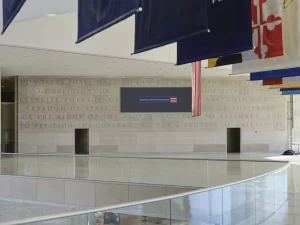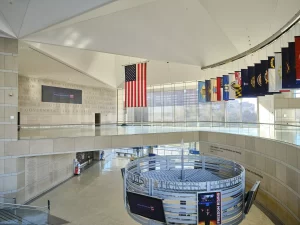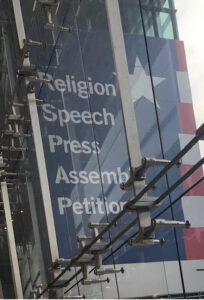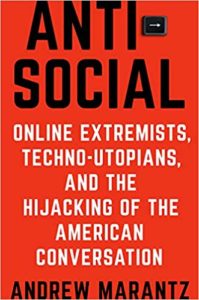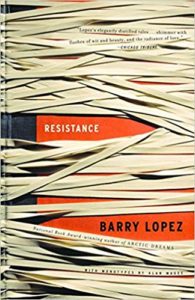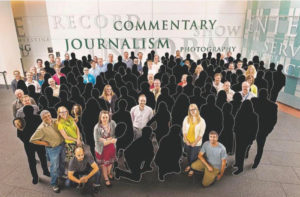free speech
A new home.
January 31, 2022And a ’50-ton’ move.
N
E
W
S
E
U
M
The National Constitution Center in Philadelphia announced that a 50-ton marble tablet, engraved with the 45 words of the First Amendment, has been moved successfully 150 miles from the former Newseum façade.
- The tablet now spans a 100-foot-wide wall on the Center’s Grand Hall Overlook.
An unveiling ceremony will be held this spring, along with a First Amendment symposium featuring leading experts and scholars.
The tablet, made of Tennessee pink marble, was engraved and erected in 2007 at the Newseum’s former home at 555 Pennsylvania Ave., and it was seen for years during the opening of ABC’s “This Week.”
- After the museum closed in 2019, the Freedom Forum donated the tablet to the National Constitution Center.
[AXIOS]
Congress shall make no law respecting an establishment of religion, or prohibiting the free exercise thereof; or abridging the freedom of speech, or of the press; or the right of the people peaceably to assemble, and to petition the Government for a redress of grievances.
I was able to visit the NEWSEUM in DC shortly before they permanently closed their doors due to a financial shortfall. It was spectacular and inspiring; I spent two full days exploring the exhibits, while wondering again and again how such an important and needed tapestry of history could be closing. Perhaps more exhibits will be shared, like this spectacular and poignant marble tablet. -dayle
Peninsula College
December 2, 2020Would love to have you join us! ~dayle
Public Speaking Workshop
About this Event
Meets: Monday and Wednesday
Dates: January 13 and January 15
Format: Zoom Classroom
Instructor: Dayle Ohlau
“According to most studies, people’s number one fear is public speaking. Number two is death. This means to the average person, if you go to a funeral, you’re better off in the casket than doing the eulogy.” – Comedian Jerry Seinfeld
Professional public speaking is not a death wish! We’re going to keep you out of the box and brighten the skills you didn’t even know you already have in this two-day introductory course to Professional Public Speaking.
Research indicates that oral communication skills are the number one factor in employment success, beyond self-motivation, problem-solving, decision-making, and leadership skills. This class will help you strengthen your ability to communicate effectively in a professional environment. The instructor, Dayle Ohlau, has taught various college-level communication classes and formerly hosted and produced radio programs in southern California, as well as a CBS-TV news program in Northern Michigan. For this course she will focus on verbal, non-verbal, and listening communication skills with an emphasis on interpersonal and small-group dynamics.
Required: Computer with a microphone and the ability to download the zoom add-on to a PC, tablet, or phone.
[A full class will be offered in February.]
Instructor Biography:
Dayle Ohlau is a native of San Diego, California, living in Sun Valley, Idaho for the past 20 years. She is an adjunct professor in communications and public speaking with a 37-year background in radio and TV broadcasting. Dayle majored in communications at DePauw University in Indiana, and human behavior for her Master’s Degree in San Diego. She is currently working on her PhD with the California Institution of Integral Studies in San Francisco.
To register, follow the link:
https://www.eventbrite.com/e/public-speaking-workshop-registration-131264137569
Peninsula College is a public community college in Port Angeles, Washington, on the Olympic Peninsula. It serves Clallam and Jefferson Counties and extends from the Pacific Ocean at Neah Bay to Brinnon on Hood Canal. It was founded in 1961 by a group of local citizens.
Algorithms…the New Gatekeeper
November 24, 2019“Cassius was right. ‘The fault, dear Brutus, is not in our stars, but in ourselves.'”
Edward R. Murrow
March 9th, 1954, CBS
#Newseum
The media has been dancing around this issue, for obvious reasons, far too long.
Actor and comedian Sacha Baron Cohen delivered a blistering speech against social media and internet companies on Thursday evening and accused of them spreading “hate, conspiracies and lies.” Speaking at the Anti-Defamation League’s Never is Now summit in New York, Cohen specifically pointed the finger at Facebook, Google, Twitter and YouTube and accused the companies of pushing “absurdities to billions of people.” He called for a “fundamental rethink of social media.”
During his speech, Cohen rebutted points made by Facebook’s Mark Zuckerberg when the CEO spoke about free speech to Georgetown University in October. “First, Zuckerberg tried to portray this whole issue as ‘choices around free expression’. That is ludicrous. This is not about limiting anyone’s free speech. This is about giving people, including some of the most reprehensible people on earth, the biggest platform in history to reach a third of the planet.
Here is the full transcript, from his prepared remarks:
In a speech last night at the Anti-Defamation League (ADL), the actor and comedian Sacha Baron Cohen attacked Facebook and other social media platforms for enabling the proliferation of hate speech and misinformation.
The speech was striking in its sincerity – Baron Cohen appeared as himself, rather than “in character” as one of his satirical personas – and its blistering tone.
Describing Facebook as “the greatest propaganda machine in history”, Baron Cohen argued that the company, which does not vet political ads for truthfulness, would have allowed Hitler to run propaganda on its platform.
Here is the full transcript, from his prepared remarks:
Conflict is attention. Attention is influence.
The Atlantic
The Dark Psychology of Social Networks
Why it feels like everything is going haywire
By Jonathan Haidt & Tobias Rose-Stockwell
For example, in “Federalist No. 10,” James Madison wrote about his fear of the power of “faction,” by which he meant strong partisanship or group interest that “inflamed [men] with mutual animosity” and made them forget about the common good. He thought that the vastness of the United States might offer some protection from the ravages of factionalism, because it would be hard for anyone to spread outrage over such a large distance. Madison presumed that factious or divisive leaders “may kindle a flame within their particular States, but will be unable to spread a general conflagration through the other States.” The Constitution included mechanisms to slow things down, let passions cool, and encourage reflection and deliberation.
Madison’s design has proved durable. But what would happen to American democracy if, one day in the early 21st century, a technology appeared that—over the course of a decade—changed several fundamental parameters of social and political life? What if this technology greatly increased the amount of “mutual animosity” and the speed at which outrage spread? Might we witness the political equivalent of buildings collapsing, birds falling from the sky, and the Earth moving closer to the sun?
[…]
Facebook’s early mission was “to make the world more open and connected”—and in the first days of social media, many people assumed that a huge global increase in connectivity would be good for democracy. As social media has aged, however, optimism has faded and the list of known or suspected harms has grown: Online political discussions (often among anonymous strangers) are experienced as angrier and less civil than those in real life; networks of partisans co-create worldviews that can become more and more extreme; disinformation campaigns flourish; violent ideologies lure recruits.
[…]
Social media turns many of our most politically engaged citizens into Madison’s nightmare: arsonists who compete to create the most inflammatory posts and images, which they can distribute across the country in an instant while their public sociometer displays how far their creations have traveled.
https://www.theatlantic.com/magazine/archive/2019/12/social-media-democracy/600763/
From the December 2019 issue.
'Morality, if it is to remain or become morality, must be perpetually examined, cracked, changed, made new...not everything that is faced can be changed; but nothing can be changed until it is faced.' -James Baldwin
ANTISOCIAL
Online Extremists, Techno-Utopians, and the Hijacking of the American Conversation
By Andrew Marantz
REVIEW: NYTimes
Forget the decline of gatekeepers. Imagine a world bereft of gates and uncrossable lines, with no discernible rules.
All this is what Marantz calls “American Berserk,” and the damage has been severe on a worldwide scale. Marantz is right to worry. As I have written in my Opinion columns for this newspaper, I have seen firsthand how social media sites amplify villainous voices and weaponize them, too — and it’s not clear they can be controlled. The optimism of social media’s creators has been overshadowed by the cynicism of the vicious propaganda spewed on their platforms.
In a recent column for The Times, titled “Free Speech Is Killing Us,” Marantz sounded the alarm. “Having spent the past few years embedding as a reporter with the trolls and bigots and propagandists who are experts at converting fanatical memes into national policy, I no longer have any doubt that the brutality that germinates on the internet can leap into the world of flesh and blood,” he wrote. “The question is where this leaves us. Noxious speech is causing tangible harm. Yet this fact implies a question so uncomfortable that many of us go to great lengths to avoid asking it. Namely, what should we — the government, private companies or individual citizens — be doing about it?”
Unfortunately, he has no real answers, except that all things eventually fall apart. Perhaps the jig is up, as the big platforms and the regulators who worry about what they have wrought begin to crack down on the system they’ve established. “The ranking algorithms on social media laid out clear incentives: provoke as many activating emotions as possible; lie, spin, dog-whistle; drop red pill after red pill; step up to the line repeatedly, in creative new ways.”
College Journalists speaking up for Free Speech
August 25, 2019Society of Professional Journalists
[Founded as Sigma Delta Chi at DePauw University in 1909]
“The real crisis of campus speech lies elsewhere—in the erosion of student newspapers…. Today, these outlets are imperiled by the same economic forces that have hollowed out local newspapers from coast to coast.”
Bureaucrats Put the Squeeze on College Newspapers
The corporatization of higher education has rendered a once-indispensable part of student life irrelevant, right when it’s needed the most.

In this this, Sunday, April 22, 2018 photo, while pushing up against a deadline, students collaborate to put out the upcoming edition of the Washington Square News, New York University’s independent, student-run, newspaper in New York. College journalists are speaking up for themselves in a coordinated campaign to combat some of the same forces that have battered newspapers across the country. More than 100 college newsrooms across the U.S., including the Washington Square News, are using social media campaigns, public awareness events and editorials Wednesday, April 25 to call attention to the important roles they play. (AP Photo/Kathy Willens)
The Atlantic
August 23, 2019
When professional pundits talk about dangers to free expression on campus, they typically refer to a handful of incidents in which colleges have revoked invitations for controversial speakers. This, however, is a fringe issue, confined to a small number of universities. The real crisis of campus speech lies elsewhere—in the erosion of student newspapers. These once-stalwart publications have long served as consistent checks against administrative malfeasance, common forums for campus debate, and training grounds for future professional journalists. Today, these outlets are imperiled by the same economic forces that have hollowed out local newspapers from coast to coast. And unlike their professional peers, student journalists face an added barrier: The kind of bureaucratic interference Liebson met at Stony Brook is becoming the norm for student journalists.
Few school newspapers are financially independent from the institutions they cover, says Chris Evans, president of the College Media Association. As a result, college administrators hold powerful leverage over student journalists and their faculty advisers. The need for aggressive student news organizations is as acute as ever. But image-obsessed administrators are hastening the demise of these once-formidable campus watchdogs.
The AAUP report notes a “growing tendency” for administrations to conduct important business matters “behind closed doors.” Administrators slow-roll student journalists’ requests for public records. At some schools, newspaper advisers have been instructed to conduct “prior review” of student articles before publication, a precaution intended to ensure that anything that could gin up bad publicity never makes it to print.
The decline of college newspapers has taken place against the backdrop of a decades-old power shift in the American university. As the Johns Hopkins University professor Benjamin Ginsberg chronicles in his 2011 book, The Fall of the Faculty, administrative bureaucracies at American universities have grown much faster than the professoriate, a trend that Ginsberg decries.
“University administrators are no different than any other corporate executives or heads of government agencies,” Ginsberg said in an interview. “They’re engaged in constant spin designed to hide any shortcomings that they or their institution might have.”
#RESIST
July 28, 2019“Wealth is Wasted on the Wealthy”
“Beware Billionaires in Philanthropic Clothes”
-McKinley Lentz, 21, Greenbay, Wisconsin
#FreeSpeach
‘Since oney is what it is, I do not deny that you may be worthy of all praise if you light your cigarettes with it. That would show you had a deep, pure sense of the ontological value of the dollar. Nevertheless, if that is all you can think of doing with money, you will not long enjoy the advantages that it can still obtain.’
-Thomas Merton, No Man Is an Island
And…
Even where totalitarianism has not yet completely wiped out all liberty, men are still subject to the corrupting effect of materialism. The world has always been selfish, but the modern world has lost all ability to control its egoism. And yet, having acquired the power to satisfy its material needs and its desire for pleasures and comfort, it has discovered that these satisfactions are not enough. They do not bring peace, they do not bring happiness. They do not bring security either to the individual or to society. We live at the precise moment when the exorbitant optimism of the materialist world has plunged into spiritual ruin. The result is an agony of ambivalence in which each man is forced to project upon his neighbors a burden of self-hatred which is too great to be tolerated by his own soul.
-Thomas Merton, The Living Bread
In that place where there are shadows may I bring light. – St. Francis
‘The lies we tell are like toys,
easy to break. Like gardens
where we play hide and seek,
and, in our excitement, make a sound
so people will know where to look.’
-Rilke, Collected French Poems
Barry Lopez:
We reject the assertion, promoted today by success-mongering bull terriers in business, in government, in religion, that humans are goal-seeking animals. We believe they are creatures in search of proportion in life, a pattern of grace. It is balance and beauty we believe people want, not triumph. The stories the earth’s peoples adhere to with greatest faith–the dances that topple fearful walls; the ethereal performances of light, color, and music, the enduring musics themselves–are all well patterned.
We feel cold.
Our goal is simple, we want our country to flourish.
A call for action.
April 9, 2018The photo illustration shows the toll that layoffs and constant turnover have taken on the staff in the five years since. […] At least two dozen more journalists will be leaving The Post because of layoffs.
“…raise(s) the question: Does this cut, which follows so many in recent years that our ranks have shriveled from more than 250 to fewer than 100 today, represent the beginning of the end for the Voice of the Rocky Mountain Empire?
The cuts, backed by our owner, the New York City hedge fund Alden Global Capital, also are a mystery, if you look at them from the point of view of those of us intent on running a serious news operation befitting the city that bears our name. Media experts locally and nationally question why our future looks so bleak, as many newspapers still enjoy double-digit profits and our management reported solid profits as recently as last year.
We call for action. Consider this editorial and this Sunday’s Perspective offerings a plea to Alden — owner of Digital First Media, one of the largest newspaper chains in the country — to rethink its business strategy across all its newspaper holdings.Consider this also a signal to our community and civic leaders that they ought to demand better. Denver deserves a newspaper owner who supports its newsroom. If Alden isn’t willing to do good journalism here, it should sell The Post to owners who will.
[full article]
